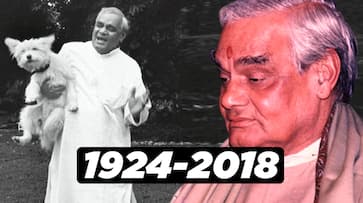As Vajpayee leaves us on his eternal journey, I am sure that he would be proud of the legacy he left and content that his life-long mission is now in the hands of a true karmayogi, recalls this admirer
There is something about May 16. Although originally from a small village in Gorakhpur, I grew up in Allahabad. But every summer vacation would invariably be spent in our village in Gorakhpur. It was no different in 1996. Except for the fact that on May 16 that year, Atal Bihari Vajpayee was to take oath as Prime Minister.
In the entire village, only our home had a functional television set. We knew that the entire village would gather outside to watch the oath ceremony live. As we made makeshift arrangements to make it convenient for a large number of people to watch from a single television, one other problem struck us.
What if there is no electricity at the time of the oath-taking? How would the TV set run? Although our village used to get intermittent electrical supply, they were always in the evenings. Rarely, if ever, was there electricity during the daytime.
So, we scrambled at the last minute to arrange some batteries (mostly used in tractors) in the hope of connecting them together to ensure a workable supply for the TV set. However, as the light bulbs sprang to life at exactly 12 pm that day, a collective loud cheer went up — one that was bettered only when Vajpayee actually took oath and shook hands with Shankar Dayal Sharma.
Darkness had ended. The BJP era had begun.
From the prophetic “अँधेरा छटेगा, सूरज निकलेगा, कमल खिलेगा” (darkness will lift, sun will be out, the lotus will bloom) in 1980 to standing poised and calm even as he announced the bringing down of the discriminatory nuclear order in 1998, and from “ज़मीन को समतल करना पड़ेगा” (we have to even out the ground here) in 1992 to unleashing the connectivity revolution in India, Vajpayee came to embody for many generations the possibilities that existed when a rooted leadership was in charge.
For the BJP supporters and workers, he gave them the lexicon and the vocabulary in which to converse. Even when the BJP was a minuscule political force, the ordinary worker still walked tall and with pride — for his leader was one with the stature of Vajpayee.
Many remember his duels with Nehru in Parliament, some remember him, mistakenly as it would emerge, for calling Indira Gandhi the modern Durga after 1971 war. Many remember Vajpayee for the historic speech that he gave in Hindi in the UN while many more remember him for representing the Government of India in 1994, even while he was the leader of Opposition!
For me, the two defining features of Vajpayee are the life-long friendship that he forged with Advani and the service they together rendered to strengthen democracy and the connectivity revolution that he unleashed in the last years of the last century.
The Vajpayee-Advani duo converted India from a single-party rule to a definite two-pole system, with BJP now emerging as the pre-dominant national party. It was not an easy task to achieve in a country as diverse as ours. However, within their own lifetime, they managed to make India’s democracy more vibrant, more representative and more rooted.
The connectivity revolution that Vajpayee unleashed when he got a full term after 1998 unleashed opportunities which changed India forever. We all have heard about the highways, airports and the mobile revolution which he not just conceptualised but also executed on the ground during his tenure.
However, what he actually did was to, for the first time, truly connect India. As people travelled more and communicated more, our bonds not only deepened but the impulses of our common civilisational heritage were further strengthened. For thousands of life-long BJP supporters like me, this was the moment that inspired us to believe that we could once again, within our lifetime, rise as a nation.
But was Vajpayee, who lived such an illustrious life, without any faults? In hindsight, one could argue that he was too nice and too gentlemanly. A vicious ancien regime, during the next decade, almost completely subverted his agenda and with it, the rise of India. However, for how long could the consciousness and aspirations of a New India, once aroused, remain suppressed?
In the summer of May 1996, on the 16th, one mass leader of India gave us a glimpse of the possibilities. And on another May 16, this time in 2014, another son of the soil was decisively handed over the mantle by the people of India. As Vajpayee leaves us on his eternal journey, I am sure that he would be proud of the legacy he left and content that his life-long mission is now in the hands of a true karmayogi.
Akhilesh Mishra is CEO, Bluekraft Digital Foundation and former Director of MyGov India. He tweets @amishra77. He is a senior professional from the construction industry and saw first-hand the energy and dynamism that Vajpayee brought in the sector. Later, Akhilesh volunteered for Prime Minister Modi’s 2014 campaign.
Last Updated Aug 16, 2018, 7:30 PM IST






![Salman Khan sets stage on fire for Anant Ambani, Radhika Merchant pre-wedding festivities [WATCH] ATG](https://static-gi.asianetnews.com/images/01hr1hh8y86gvb4kbqgnyhc0w0/whatsapp-image-2024-03-03-at-12-24-37-pm_100x60xt.jpg)
![Pregnant Deepika Padukone dances with Ranveer Singh at Anant Ambani, Radhika Merchant pre-wedding bash [WATCH] ATG](https://static-gi.asianetnews.com/images/01hr1ffyd3nzqzgm6ba0k87vr8/whatsapp-image-2024-03-03-at-11-45-35-am_100x60xt.jpg)


